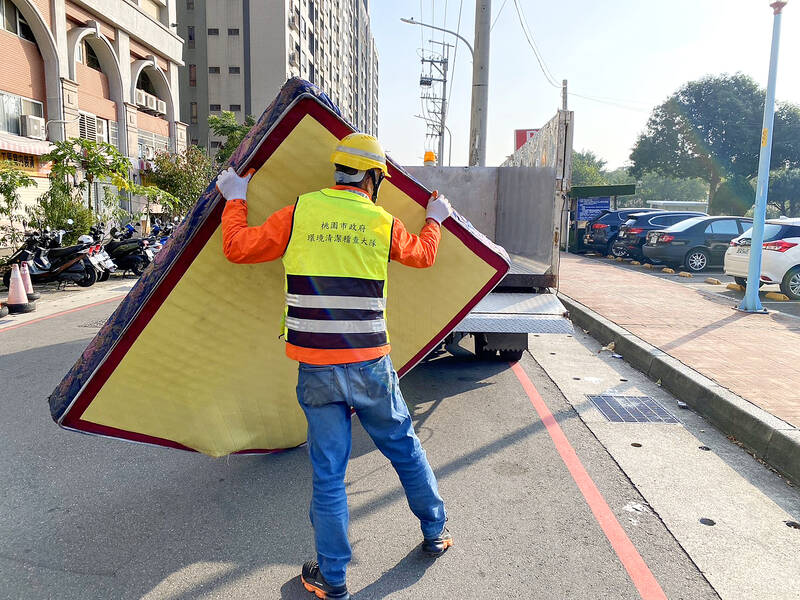The rate at which furniture is being thrown away is rising, the Ministry of Environment said, with 170,000 tonnes of bulky waste reported last year through September and the full-year total expected to exceed the amount from a year earlier.
Bulky waste grew to 220,000 tonnes in 2022, the most ever, with about 20 percent growth compared with 2021, when 180,000 tonnes of bulky waste was recorded, the data showed.
The ministry said that the growth in the number of pieces of furniture being disposed of is due to the rise of more affordable “fast furniture,” which leads to a heightened rate of replacement.

Photo courtesy of the Taoyuan Department of Environmental Protection
Department of Environmental Administration Common Disposables Management Division deputy director-general Liu Chu-ti (劉俊?) on Saturday last week said that the ministry has not conducted a more detailed inventory check of bulky waste items and cannot say for certain what items are contributing to the growing figures.
Traditional furniture is made of hardwood, which normally has some value after many years of use, whether it is repaired or recycled, but the fast furniture trend does not prioritize durability, instead focusing on affordability or design, he said.
This leads to more easily damaged parts, resulting in a lot of furniture being thrown away after one or two years of use, he said.
Taipei, New Taipei City and Taoyuan have established sites to promote recycling and reusing furniture, providing the opportunity to obtain second-hand furniture at a lower price while reducing the amount of waste, he said.
Taipei Department of Environmental Affairs Recycling Division chief Wu Chen-hao (吳鎮豪) said an increased number of large dinner tables indicates a change in habits or smaller families than before.
Wu said the increased number of disposed TV cabinets shows that people prefer to hang TVs on walls to save space or that some households no longer have TVs.
Meanwhile, a third-party report commissioned by the ministry said the country’s annual rate of mattress disposal — at 746,000 — exceeds its recycling capacity, adding that at least 140,000 mattresses have not been recycled yet and have been stacked up at recycling stations.
Taoyuan has the most non-recycled mattresses, and the ministry has allotted funding to subsidize the city to purchase more crushers, Liu said.
However, even with more crusher machines, a great number of workers is required to dismantle pocket-spring mattresses before they can be crushed, Liu said, adding that as the Lunar New Year holiday is often a peak period of old mattresses being retired, local cleaning crews have to set aside mattress processing for the time being.
Latex and filling from mattresses are usually incinerated, but as most incinerators are old, the calorific value of incinerators is often not enough to process the fillings and latex, resulting in slower processing, he said.
Ministry official Lin Chien-san (林建三) said the ministry is assessing the possibility of having mattress producers assist in recycling of used mattresses and making them officially recyclable items, but further talks are needed.
Taiwan’s annual mattress sales average 330,000, with a market value estimated at NT$10 billion (US$319.4 million), but distributors said that they do not have a system in place to recycle mattresses and they would discuss the issue with local governments.

Three Taiwanese airlines have prohibited passengers from packing Bluetooth earbuds and their charger cases in checked luggage. EVA Air and Uni Air said that Bluetooth earbuds and charger cases are categorized as portable electronic devices, which should be switched off if they are placed in checked luggage based on international aviation safety regulations. They must not be in standby or sleep mode. However, as charging would continue when earbuds are placed in the charger cases, which would contravene international aviation regulations, their cases must be carried as hand luggage, they said. Tigerair Taiwan said that earbud charger cases are equipped

Foreign travelers entering Taiwan on a short layover via Taiwan Taoyuan International Airport are receiving NT$600 gift vouchers from yesterday, the Tourism Administration said, adding that it hopes the incentive would boost tourism consumption at the airport. The program, which allows travelers holding non-Taiwan passports who enter the country during a layover of up to 24 hours to claim a voucher, aims to promote attractions at the airport, the agency said in a statement on Friday. To participate, travelers must sign up on the campaign Web site, the agency said. They can then present their passport and boarding pass for their connecting international

UNILATERAL MOVES: Officials have raised concerns that Beijing could try to exert economic control over Kinmen in a key development plan next year The Civil Aviation Administration (CAA) yesterday said that China has so far failed to provide any information about a new airport expected to open next year that is less than 10km from a Taiwanese airport, raising flight safety concerns. Xiamen Xiangan International Airport is only about 3km at its closest point from the islands in Kinmen County — the scene of on-off fighting during the Cold War — and construction work can be seen and heard clearly from the Taiwan side. In a written statement sent to Reuters, the CAA said that airports close to each other need detailed advanced

The age requirement for commercial pilots and airline transport pilots is to be lowered by two years, to 18 and 21 years respectively, to expand the pool of pilots in accordance with international standards, the Ministry of Transportation and Communications announced today. The changes are part of amendments to articles 93, 119 and 121 of the Regulations Governing Licenses and Ratings for Airmen (航空人員檢定給證管理規則). The amendments take into account age requirements for aviation personnel certification in the Convention on International Civil Aviation and EU’s aviation safety regulations, as well as the practical needs of managing aviation personnel licensing, the ministry said. The ministry